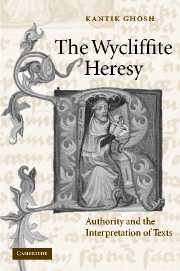Book contents
- Frontmatter
- Contents
- Acknowledgements
- List of abbreviations
- Introduction
- 1 John Wyclif and the truth of sacred scripture
- 2 William Woodford's anti-Wycliffite hermeneutics
- 3 Vernacular translations of the Bible and ‘authority’
- 4 The English Wycliffite sermons: ‘thinking in alternatives’?
- 5 Nicholas Love and the Lollards
- 6 Thomas Netter and John Wyclif: hermeneutic confrères?
- Afterword: Lollardy and late-medieval intellectuality
- Notes
- Bibliography
- Index of names and titles
- General index
- CAMBRIDGE STUDIES IN MEDIEVAL LITERATURE
4 - The English Wycliffite sermons: ‘thinking in alternatives’?
Published online by Cambridge University Press: 22 September 2009
- Frontmatter
- Contents
- Acknowledgements
- List of abbreviations
- Introduction
- 1 John Wyclif and the truth of sacred scripture
- 2 William Woodford's anti-Wycliffite hermeneutics
- 3 Vernacular translations of the Bible and ‘authority’
- 4 The English Wycliffite sermons: ‘thinking in alternatives’?
- 5 Nicholas Love and the Lollards
- 6 Thomas Netter and John Wyclif: hermeneutic confrères?
- Afterword: Lollardy and late-medieval intellectuality
- Notes
- Bibliography
- Index of names and titles
- General index
- CAMBRIDGE STUDIES IN MEDIEVAL LITERATURE
Summary
The 294 Wycliffite sermons of the long English cycle remain somewhat of a mystery. That they were composed as parts of a single unified whole seems, on the evidence supplied by Anne Hudson, beyond doubt. Not only are they found in the extant manuscripts either in the form of the full cycle or in the form of selections based on comprehensible liturgical patterns, but there is also no evidence that any part of the cycle was allowed to circulate before the whole was complete. The sheer volume of material would suggest a collaborative effort, but authorship, whether single or multiple, remains obscure. What is even more puzzling is the intended purpose of the sermons. Some are in the nature of skeleton-pieces, providing only a basic gloss on the lection, with the implication that the speaker should build upon the framework provided; others offer extended passages of polemic and fuller exegeses. The tonal variation is great: occasionally, the sermons seem to assume a fairly learned audience and therefore include logical references and recondite academic jokes; at other times, the audience visualised seems to have been secular and lay, one which would sympathise with the denigration of academics and the mockery directed against clerical pretensions. Equally interesting is the presentation of the text in the manuscripts.
- Type
- Chapter
- Information
- The Wycliffite HeresyAuthority and the Interpretation of Texts, pp. 112 - 146Publisher: Cambridge University PressPrint publication year: 2001



